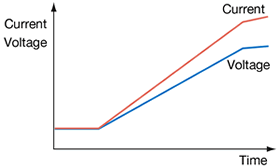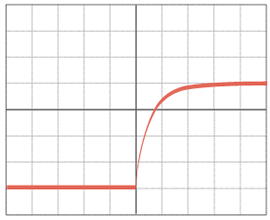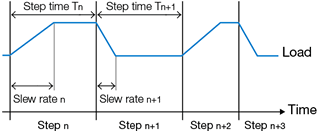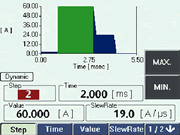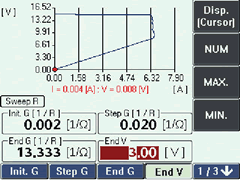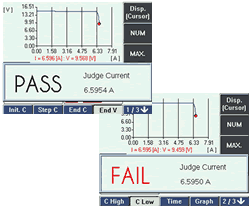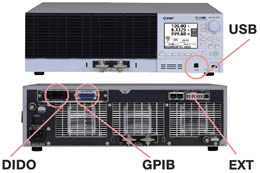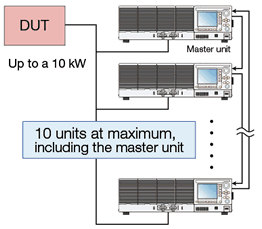DL300L Electronic Load DL series
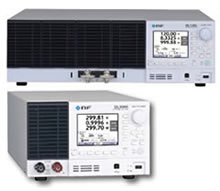 |

|
| Low voltage operation like real resistors |
|
| High Slew rate: 30 A/£gs max. (at CC mode of DL1000L) |
|
| Load modes up to six Constant Current (CC), Constant Resistance (CR), Constant Voltage (CV), Constant Power (CP), External Control (EXT) and Short (SHORT) |
|
| Dynamic mode Executes with switching 16 load conditions at maximum in series. |
|
| Three sweep modes |
|
Interface |
|
| Parallel operation, multi-channel synchronous operation |
|
| Ripple noise measurement (optional) |
| Maximum ratings | DL300L |
DL300H |
DL1000L |
DL1000H |
| Voltage | 120 V |
500 V |
120 V |
500 V |
| Current | 60 A |
12 A |
180 A |
36 A |
| Power | 300 W |
1000 W |
||
Low voltage operation like real resistors
| The DL series is free from discontinuity in current at the minimum operating voltage, or slow rise owing to soft start function to avoid that, so operates like real resistors from 0 V. |
|||
|
|
||
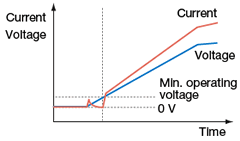 |
|||
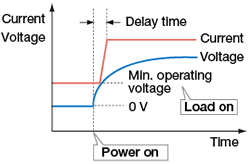 |
|||
Fast feedback control of current
| Current overshoots or oscillations which tend to appear around set value are eliminated with fast feedback control of current. Smooth rising current waveform with high slew rate (30 A/£gs max. at CC mode of DL1000L) is realized. |
||||||||||||
|
||||||||||||
Load modes up to six
Available load modes are Constant Current (CC), Constant Resistance (CR), Constant Voltage (CV), Constant Power (CP), External Control (EXT) and Short (SHORT). Using current limit at CV mode operates like a CV/CC mode which is suitable for battery discharging. You can also switch modes or shut down load input automatically when the load voltage reaches set value, using a special function (VMode). |
||||||||||||||||||||||||||||||||||||
|
||||||||||||||||||||||||||||||||||||
Dynamic mode
The Dynamic mode has 16 steps at maximum (each step time can be set by 1 £gs at minimum) with a selectable operation of one shot or repeat. Sequence operation of 1024 steps at maximum (repeat function is selectable) can be executed with USB or GPIB control. |
||
|
3 Sweep modes
Three types of characteristic tests can be executed using only a main unit: SweepR providing V-I characteristic tests, Sweep C providing overcurrent protection characteristic tests (with pass-fail judgements) of power source equipments and Sweep P providing overload protection characteristic function (with pass-fail judgements) of power source equipments. |
||||
|
Ready for automatic measurement system
| USB interface is a standard. Optional GPIB and DIDO control can be added. |
|
|
Parallel operation, multi-channel synchronous operation
| Parallel connection using optional system cables can provide up to a 10 kW system at maximum, and multi-channel synchronous operation can synchronize load on/off control, load fluctuation control, etc. of more than one DL series. |
|
|
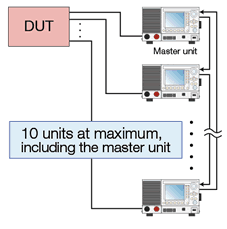 |
Ripple noise measurement (optional)
You can optionally add a measurement function which is equivalent to a ripple noise measurement with a 100 MHz oscilloscope recommended in the Japan Electronics and Information Technology Industries Association (JEITA) standard. Spike-like switching noises, influence of line-frequency, and so on are separated in this measurement. You can eliminate individual variations which often become a problem in measurements using oscilloscopes. Moreover, you can reduce the measurement time. |
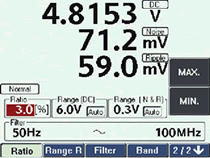 |
